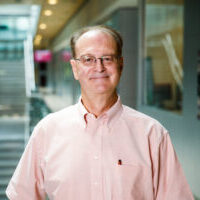Bruce Rittmann
Director of the Biodesign Swette Center for Environmental Biotechnology
Regents’ Professor, School of Sustainable Engineering and Built Environment, ASU
Bio
Dr. Bruce E. Rittmann, PhD, NAE, is the director of the Biodesign Swette Center for Environmental Biotechnology and Regents’ Professor in the School of Sustainable Engineering and Built Environment at Arizona State University. Dr. Rittmann has received many accolades during his career. Highlights are being elected a member of the National Academy of Engineering, a Distinguished Member of the American Society of Civil Engineers, an Honorary Member of the American Academy of Environmental Engineers and Scientists, and 2018 Laureate of the Stockholm Water Prize. Dr. Rittmann also is a Fellow of the American Association for the Advancement of Sciences, International Water Association, Water Environment Federation, Association of Environmental Engineering and Science Professors, and the National Academy of Inventors. He also won the Arizona BioIndustry Association’s Award for Research Excellence, the American Society of Civil Engineers’ Simon W. Freese, Huber, and Hering Awards, the National Water Research Institute’s Clarke Prize for Outstanding Achievement in Water Science and Technology, the Queneau Palladium Medal from the American Association of Engineering Societies, the Perry L. McCarty Founders’ Award from the Association of Environmental Engineering and Science Professors, the Gordon Maskew Fair Award from the American Academy of Environmental Engineers and Scientists, and the inaugural BioCluster Award from the International Water Association and the International Society for Microbial Ecology.
Rittmann earned a BS in Civil and Engineering and MS in Environmental Engineering from Washington University in St. Louis. After working in environmental engineering consulting, Dr. Rittmann earned his PhD in Environmental Engineering at Stanford University. Prior to joining Arizona State University in 2005, Dr. Rittmann was the John Evans Professor of Environmental Engineering at Northwestern University (1992 – 2004) and a professor at the University of Illinois at Urbana-Champaign (1980 – 1992).
An international leader in managing microbial communities, Rittmann is developing new ways to treat water and wastewater, capture renewable resources, and improve human health. Rittmann leads teams using two innovative approaches to generate renewable energy: anaerobic microbes that convert organic waste streams to useful energy in methane or hydrogen; and photosynthetic bacteria and algae that capture sunlight to produce feedstock for liquid fuels and valuable chemicals. One important aspect of the renewable-energy work is capturing phosphorus in a mobile form that can be used in agriculture. Dr. Rittmann was a charter member of the Sustainable Phosphorus Research Coordination Network, and his Center houses the Sustainable Phosphorus Alliance (SPA)
Dr. Rittmann has published more than 760 peer-reviewed papers, an H-index of 109, and approximately 53,000 citations of his works. His publications span from microbiological principles to field testing new technologies. His textbook, Environmental Biotechnology: Principles and Applications, 2nd ed, (McGraw-Hill) is used by universities around the world to educate students about the ways in which microorganisms can be used to improve environmental quality.
Area(s) of Expertise
Environmental Engineering

